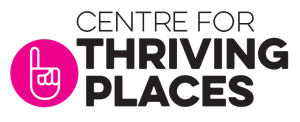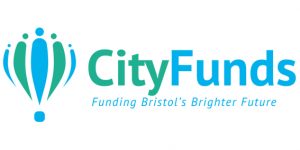Examples of our work
‘The tool keeps us on track in our aim to address inequalities and support real change in the city’ – Andy Street, City Funds.
Working with Bristol City Funds, we created a city-level evaluation framework that measures the impact of the projects they support. We adapted our Thriving Places Index (TPI) indicators to assess funding impacts against city priorities from Bristol’s One City Plan, as well as against the UN Sustainable Development Goals (SDGs). Our Happiness Pulse also helps to measure the direct benefits of the programmes supported.
This approach can be used by local governments, communities and organisations anywhere. The TPI provides a rigorous framework to understand impact across multiple projects and activities. It can be adapted to create a narrative to reflect local priorities and plans and then be used as it has been in Bristol as a shared toolkit to measure the social value delivered for citizens, communities, society and the planet.
‘CTP’s tool provides a simple and effective way to monitor our impact – our partners can easily select which themes and goals are being targeted by their initiatives and look at progress against the indicators in their project evaluations,’ – Lucy Gilbert Quartet Community Foundation, City funds partner.
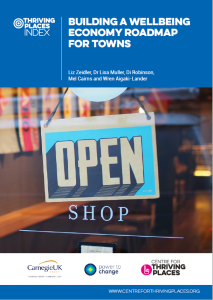
‘By adopting a wellbeing lens to policy, towns have an opportunity to focus on what residents report is important to their quality of life’ – Pippa Coutts, Carnegie UK Trust
In 2020/21, we worked with Carnegie UK Trust and Power to Change on the Wellbeing Economy Roadmap for Towns project – to understand how a wellbeing approach could be applied to UK towns. We customised our wellbeing framework, combining local knowledge in different towns with academic and policy expertise about the drivers of local conditions for wellbeing.
‘This project showed that forward-thinking places really can start to rebuild their priorities based on the things that matter most, rather than the things we have traditionally measured. Centre for Thriving Places helps to bring existing data into the service of places that want to put people’s wellbeing at the heart of making their places better’ – Bonnie Hewson, Power to Change.
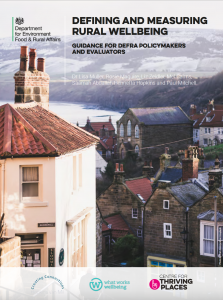
‘This report is an important, sound and robust study that culminates in a critically important and usable framework and a set of recommendations. The report sets out to put wellbeing outcomes at the heart of decision-making and I firmly believe it is capable of doing this’. – Dr Hannah Chiswell – Countryside and Community Research Institute in the Defra Peer Review.
Wellbeing research tends to focus on urban populations, resulting in policies and practices that may overlook the wellbeing of rural communities. To help them evaluate the impact of policy, the Department for Environment, Food and Rural Affairs (Defra) commissioned us in 2020 to research ways that social, economic and natural factors influence wellbeing in rural areas. We developed a new rural wellbeing framework and a report on how to apply it. It includes an indicator bank, with advice on the best available data to understand the drivers of wellbeing in rural communities.
“The new framework makes understanding drivers of wellbeing in rural areas manageable and accessible for the first time. The accompanying guidance offers opportunities for better policy and practice to support far more equitable and sustainable wellbeing for current and future generations of rural communities.” – Liz Zeidler, CTP chief executive.

‘We believe this is the first time ever that a country has been able to look at what makes the lives of citizens worthwhile”. Nancy Hey – What Works Centre for Wellbeing
Having meaning and purpose in our lives is key to our wellbeing, and why one of the four questions used by the Office for National Statistics (ONS) to measure wellbeing is ‘how much we feel the things we do are worthwhile’. Yet this is the wellbeing question we know least about.
In 2021, CTP worked with the What Works Centre for Wellbeing (WWCWB) to learn more about what fuels our sense of purpose. We conducted a review of literature and primary data analysis and the resulting briefing ‘shines a light on this under-researched aspect of wellbeing’ according to WWCWB. The research showed that, unlike the more widely used Life Satisfaction measure which is influenced by our environment and the things we have, it is the things we do and how our health and other factors affect our ability to do them that influence our sense that life is worthwhile.
‘This new research can be used to understand and highlight the different ways this important and undervalued aspect of wellbeing can be improved’ – Deborah Hardoon, What Works Centre for Wellbeing.
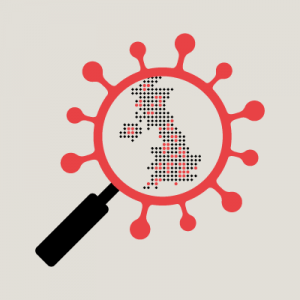
‘Which aspects of our lives have been affected most by Covid-19 and who has suffered the most? This dashboard is excellent – especially as we think about recovery and renewal. #covidWIRED – Alex Farrow – NCVO
Covid has affected wellbeing in very unequal ways in the UK. The CTP team worked with What Works Centre for Wellbeing (WWCWB) to assess how the pandemic affected people across six domains of wellbeing: health; what we do; relationships; money; where we live; and education.
The team collated over 400 research findings to produce the Covid: Wired (Wellbeing Inequalities Research Evidence Dashboard) tool, which can identify changes in each of these domains during the pandemic, and how they affected different groups of people and existing inequalities. Findings can be filtered by study design, population group and whether wellbeing outcomes got better or worse during the pandemic.
This tool is one of the most comprehensive summaries of current research into the impacts of the pandemic on wellbeing and wellbeing inequalities and the likely long term influence on the wellbeing of the nation’ – Nancy Hey WWCWB.
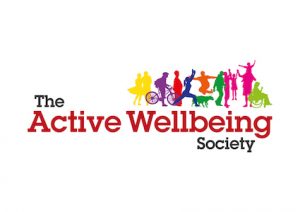 The Active Wellbeing Society (TAWS) works to develop healthy, happy communities living active and connected lives. Its programmes include Active Communities, one of 12 national pilots supported by Sport England through National Lottery funding. Working with Solihull Metropolitan Borough Council (SMBC) and Birmingham City Council, the programme aims to bring communities together through social and physical activity, encouraging people to become more connected.
The Active Wellbeing Society (TAWS) works to develop healthy, happy communities living active and connected lives. Its programmes include Active Communities, one of 12 national pilots supported by Sport England through National Lottery funding. Working with Solihull Metropolitan Borough Council (SMBC) and Birmingham City Council, the programme aims to bring communities together through social and physical activity, encouraging people to become more connected.
CTP worked with the TAWs team to develop a bespoke version of the Happiness Pulse enabling them to link survey responses with how people participate in activities, tracking change over time. These help the programme understand how participation impacts someone’s sense of belonging, self worth and community engagement. The programme also uses the TPI to assess project contribution to wider changes in the area in health, education, economy, community and place.
